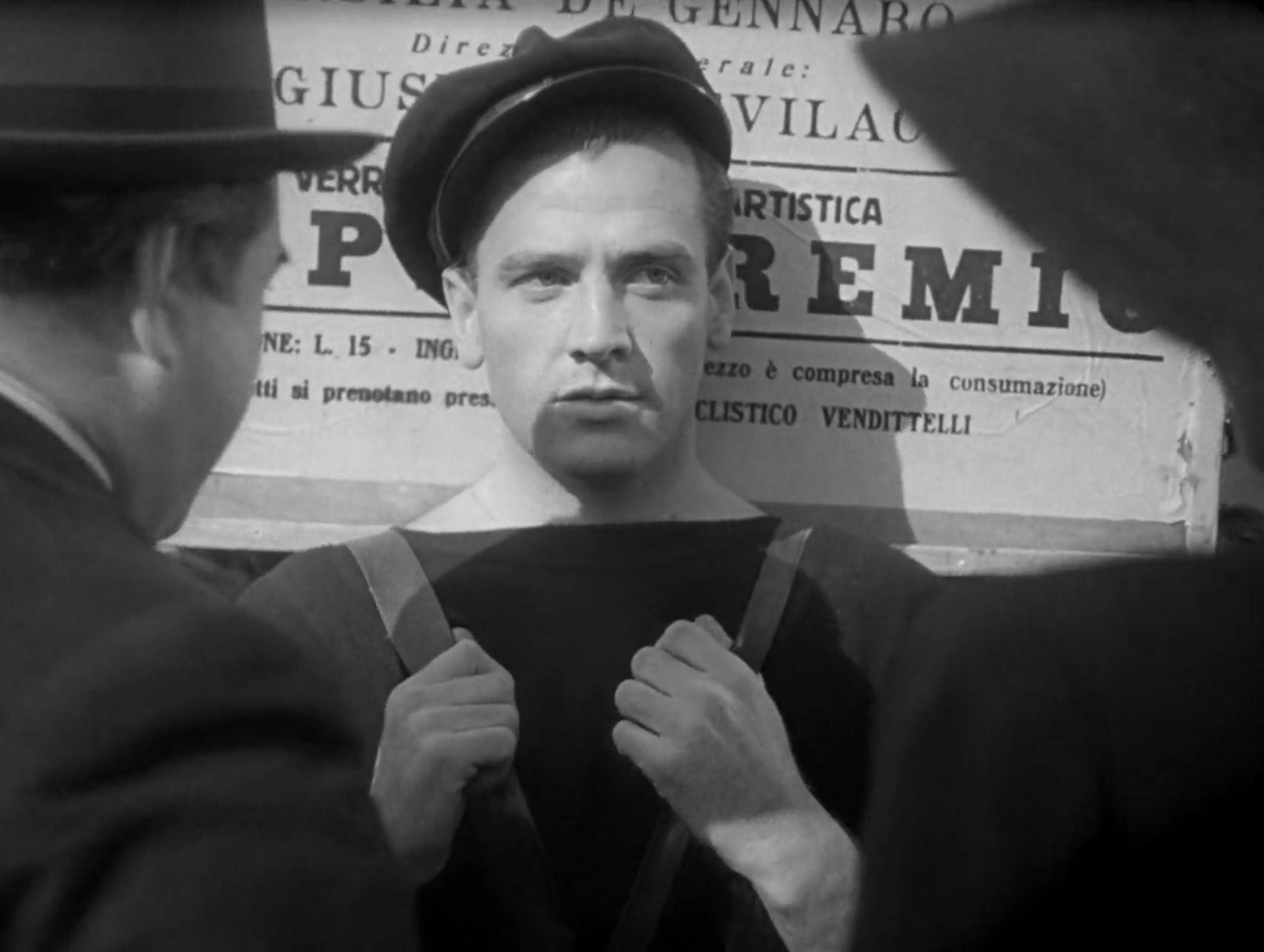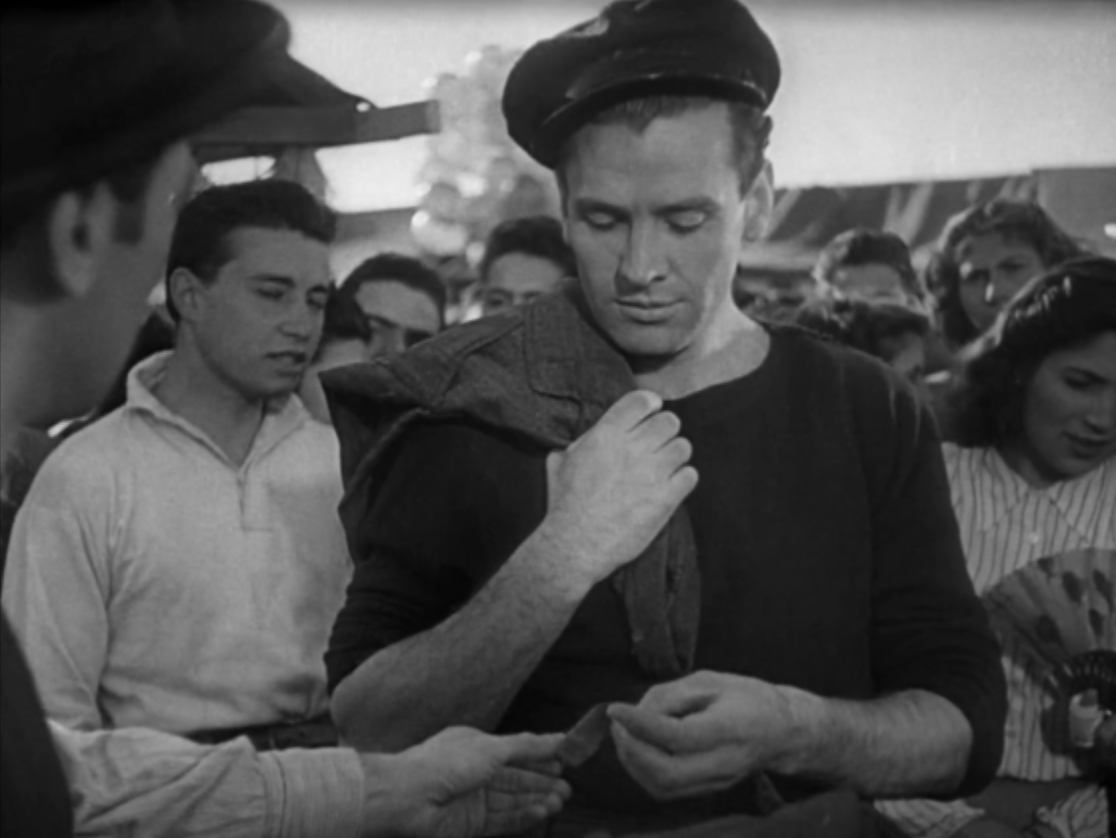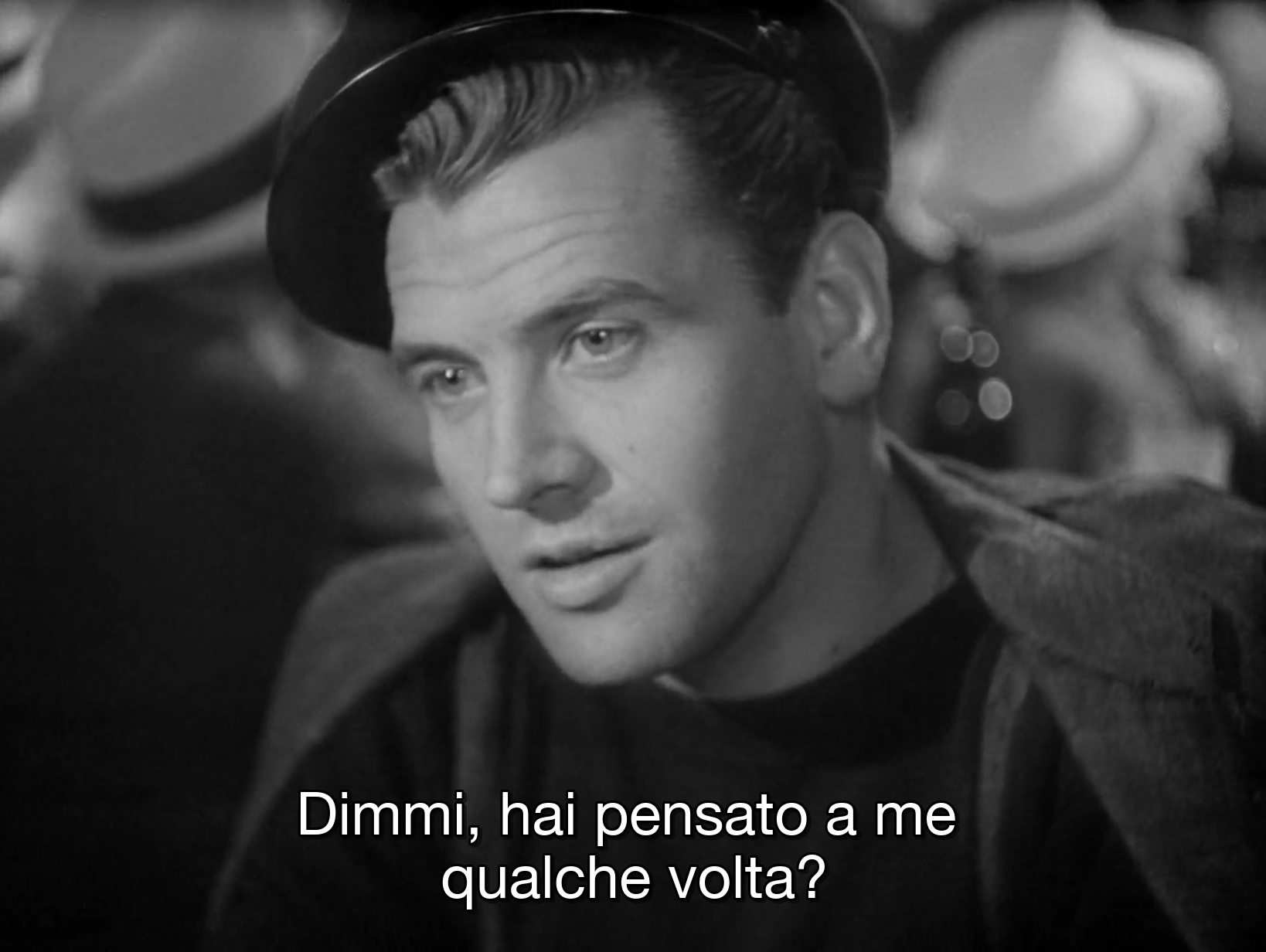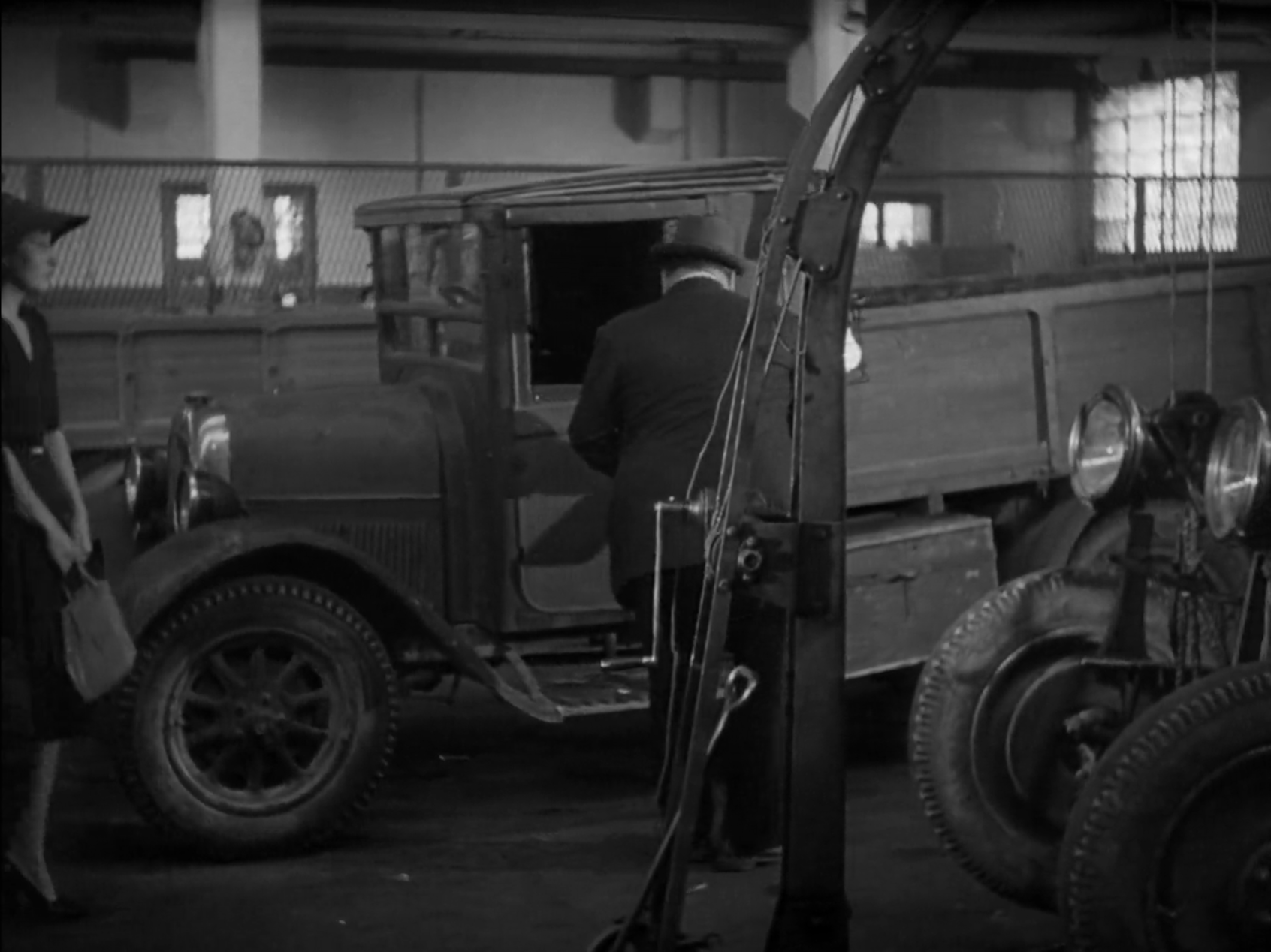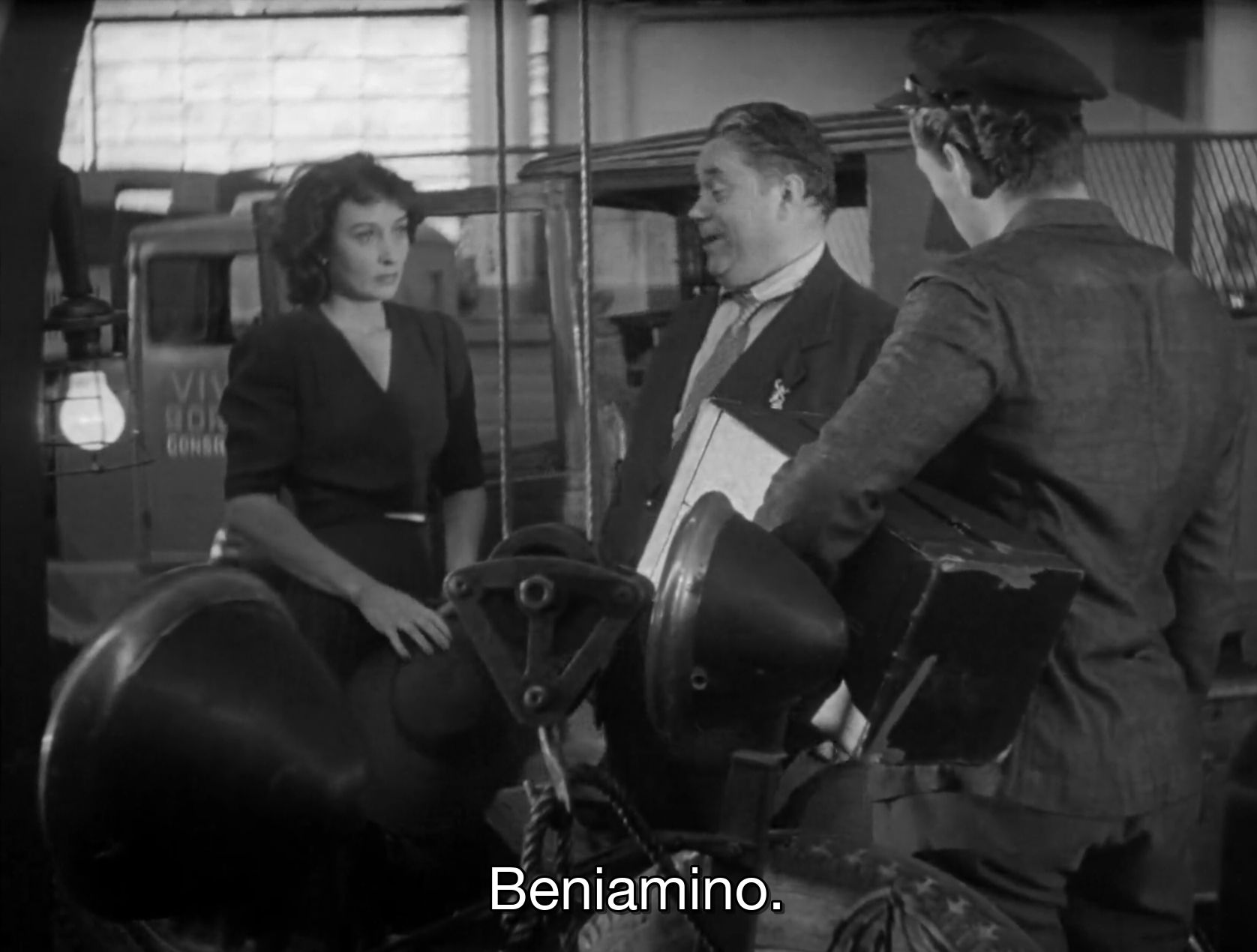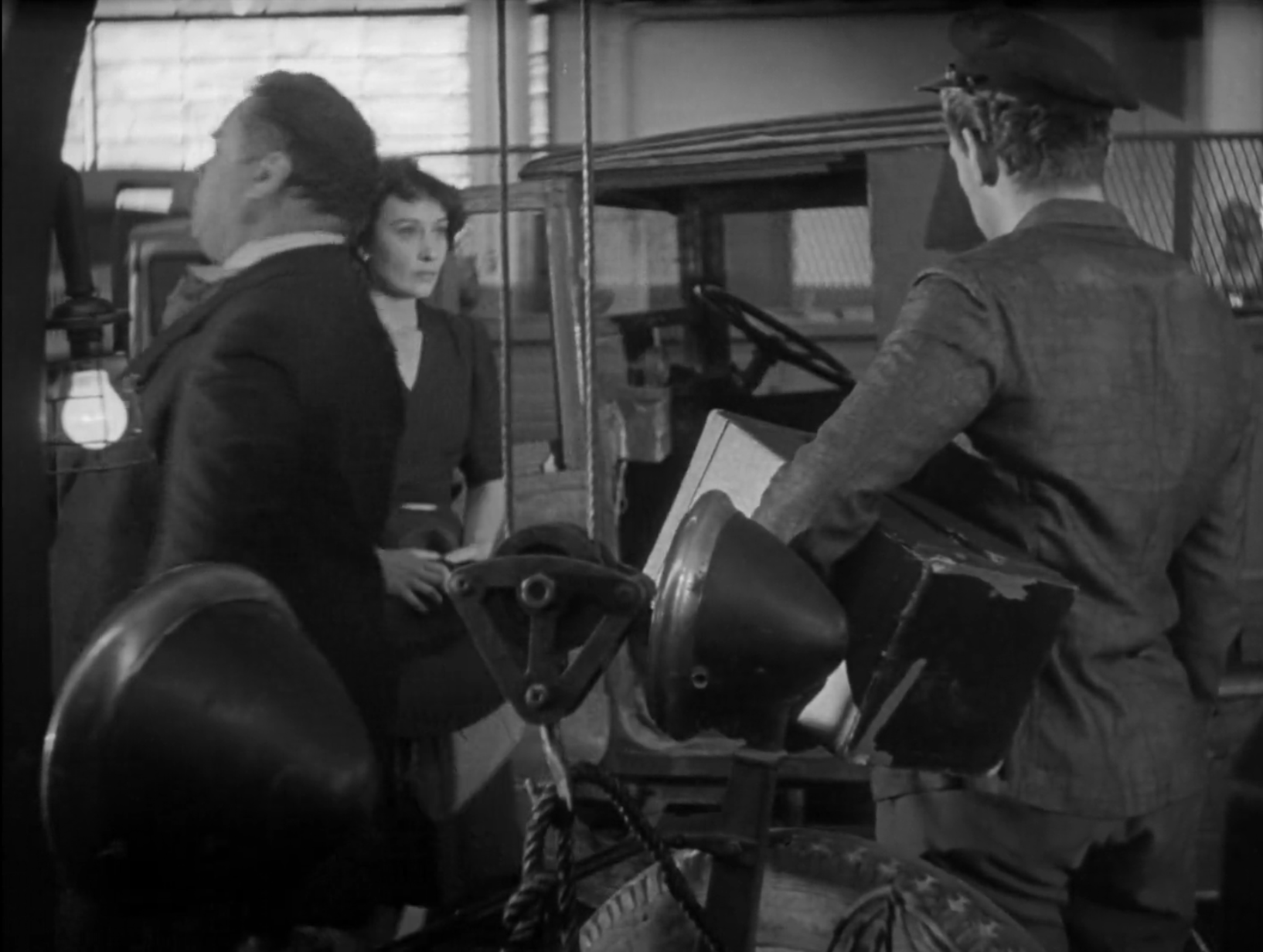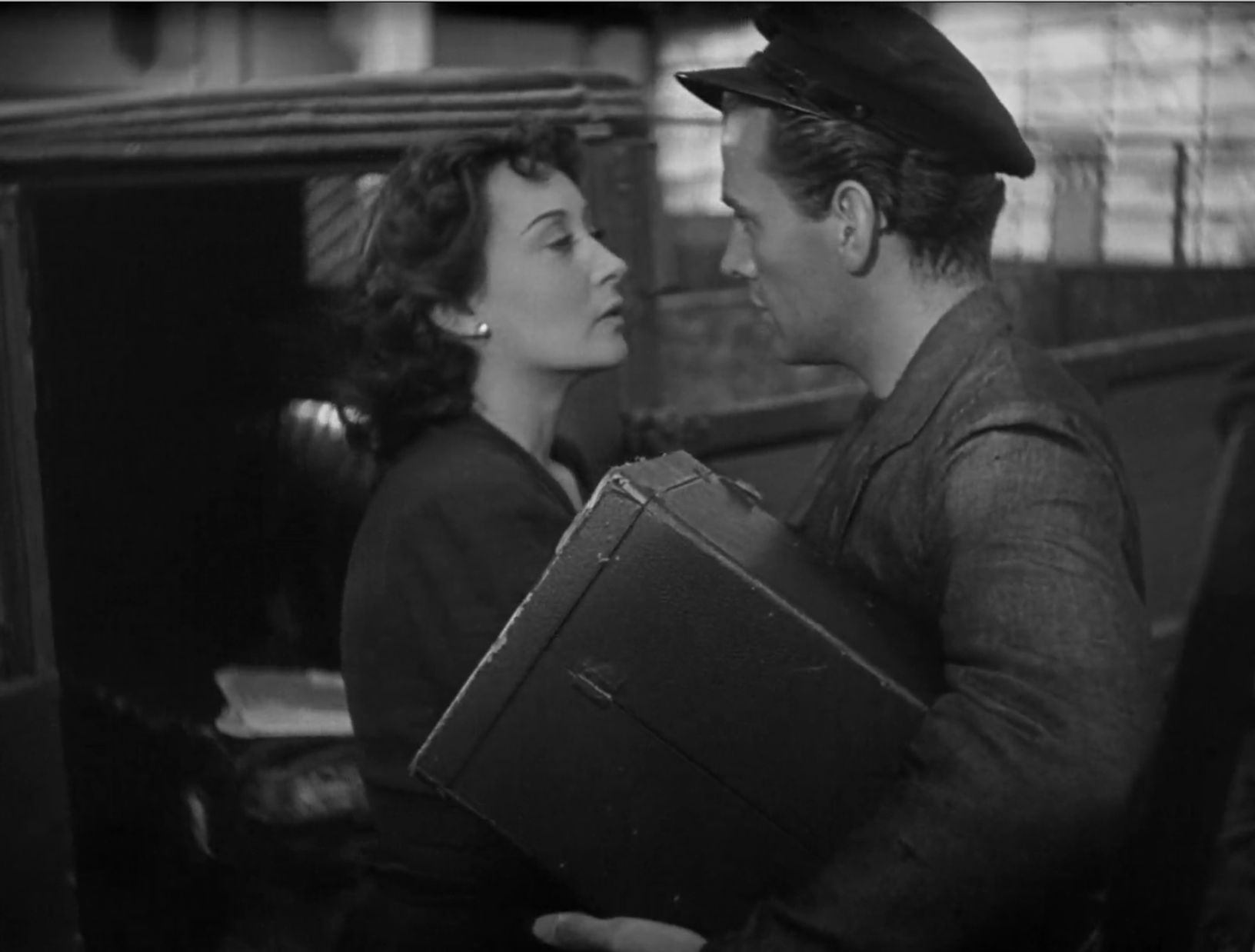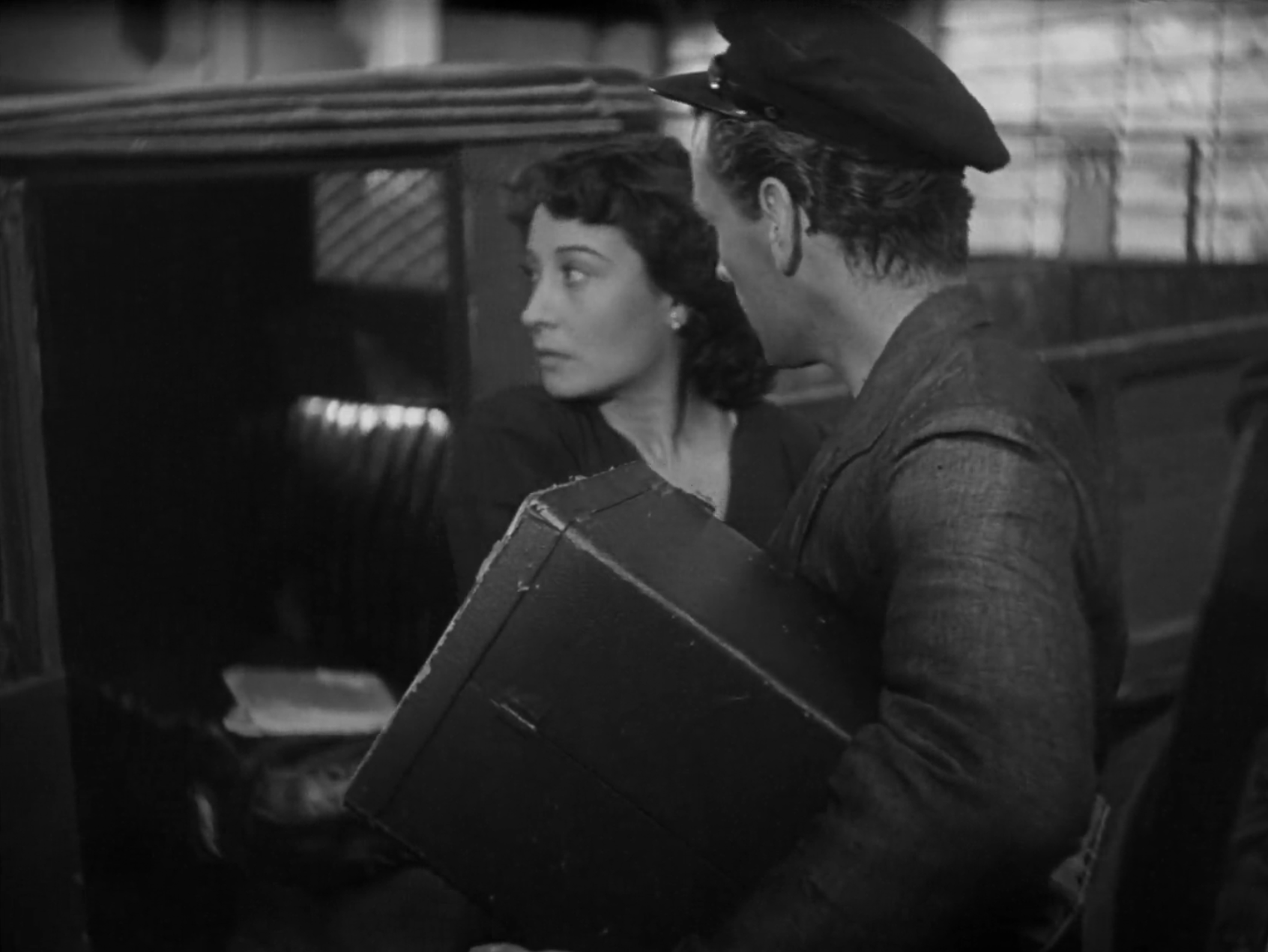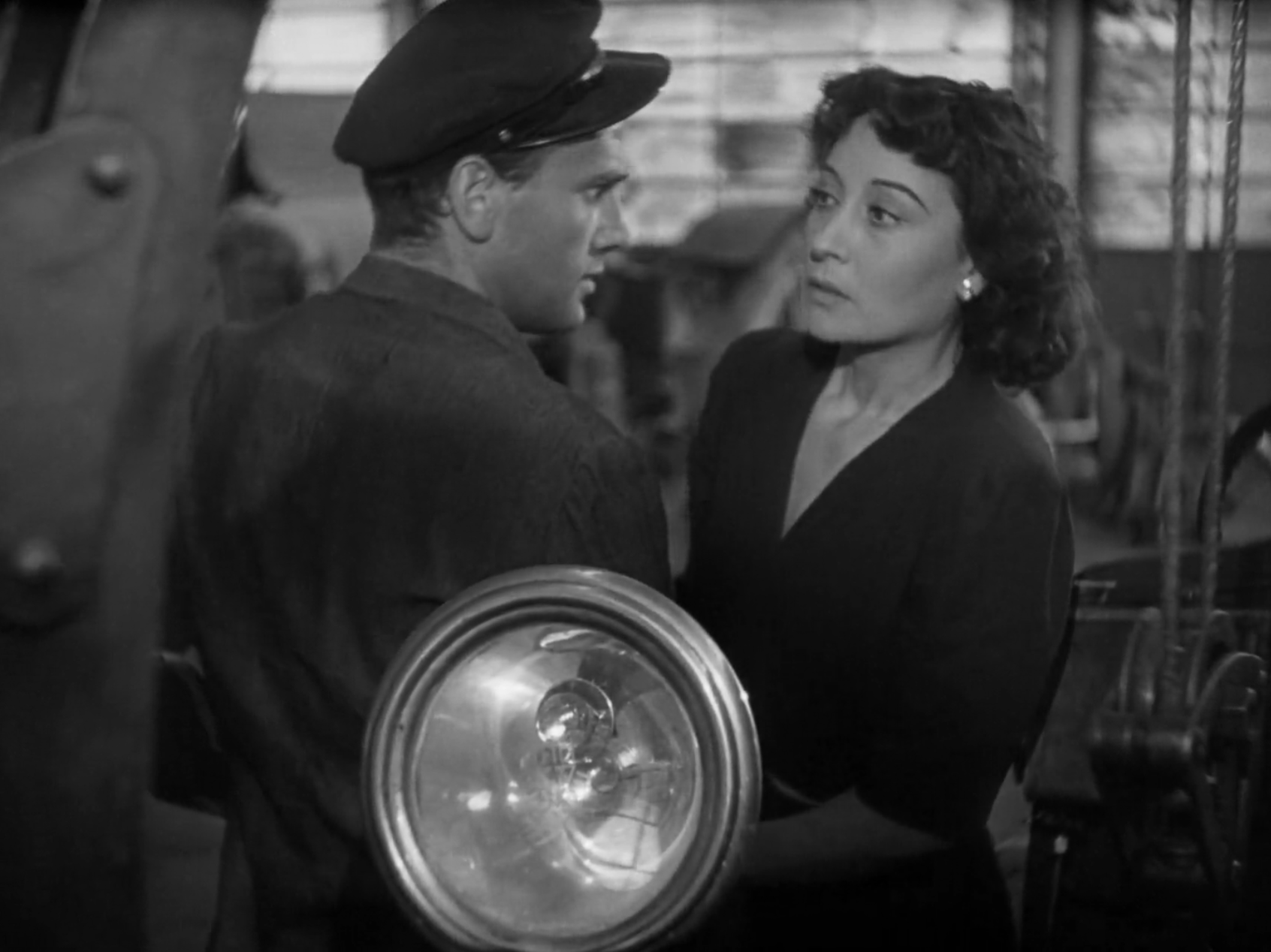Regia / Director: Luchino Visconti, 1943
Gli uomini hanno trovato lavoro. Lo Spagnolo predice il futuro in una fiera. "Per cinquanta centesimi, vi si spalancheranno le porte del futuro!" Esuberante, affascinante, attira una folla deliziata.
The men have found work. Lo Spagnolo tells fortunes at a fair. “For fifty cents, the doors of the future will open wide to you!” Exuberant, charming, he draws a delighted crowd.
Saluta Gino, che lo guarda con ammirazione. Sulle spalle Gino porta un cartello che pubblicizza un evento locale. Gli uomini sono nel loro elemento.
He waves to Gino, who looks on admiringly. On his shoulders, Gino carries a board advertising a local event. The men are in their element.
Poi qualcosa cattura l'occhio di Gino: allo spettacolo del mago degli ombrelli, ammassati tra il pubblico, ci sono Giovanna e suo marito Bragana.
Then something catches Gino’s eye: at the umbrella magician’s show, crowded among the audience, are Giovanna and her husband Bragana.
Bragana è felice di vedere Gino. Giovanna, con gli occhi bassi, non reagisce. Gino fissa fermamente Giovanna, mentre suo marito blatera, ignaro.
Bragana is delighted to see Gino. Giovanna, eyes lowered, doesn’t react. Gino stares steadily at Giovanna, while her husband babbles on, oblivious.
Finalmente i loro occhi si incontrano. Gino fissa Giovanna con infinito desiderio.
At last their eyes meet. Gino stares at Giovanna with infinite longing.
Trova lo Spagnolo e gli chiede di togliergli il cartello pubblicitario. Gino dice che va a trovare un amico, ma non vuole dire chi.
He finds lo Spagnolo and asks him to take off the advertising board. Gino says he’s going to see a male friend, but won‘t say who.
Prima che Gino se ne vada, lo Spagnolo, con uno sguardo confuso, gli porge un biglietto della fortuna.
Before Gino leaves, lo Spagnolo, with a confused look, hands him a fortune.
Gino lo legge, poi guarda su verso il suo amico. Si fissano negli occhi.
Gino reads it, then looks up at his friend. They gaze into each other’s eyes.
Alla fiera, Gino lotta tra la folla per tornare da Giovanna e Bragana.
Non molto comune all'epoca, questo tipo di scena – con tutti i tipi di italiani ammassati insieme, sia in una stazione ferroviaria, in spiaggia o in una città – diventerà un punto fermo dei successivi film neorealisti italiani.
At the fair, Gino struggles through the crowd to return to Giovanna and Bragana.
Not so common at the time, this kind of scene – with all kinds of Italians packed in together, whether in a train station, at the beach or in a town – will become a staple of later neorealist Italian films.
Riunito, il trio si dirige al Caffè Amici, un bar dove Bragana si è iscritto a un concorso di canto. In effetti, è il concorso pubblicizzato dal cartello che Gino stava portando. Un richiamo alla vita libera del mare, i marinai sono ovunque.
Mentre entrano nel bar, una concorrente sta cantando l'aria “Habanera”, dalla Carmen di Bizet, un'opera che racconta di un uomo ingenuo traviato e infine distrutto da una seduttrice.
Reunited, the threesome head for at the Caffè Amici, a bar where Bragana has registered for a singing competition. In fact, it is the contest advertised by the board Gino has been carrying. A reminder of the free life of the sea, sailors are everywhere.
As they enter the bar, a contestant is singing the “Habanera” aria from Bizet’s Carmen, an opera that tells of a naive man led astray and ultimately destroyed by a seductress.
Bragana prende posto sul palco e saluta Giovanna tra la folla. Lei risponde con un gesto poco entusiasta.
Bragana takes his place on the stage and waves to Giovanna in the crowd. She responds with a halfhearted gesture.
Mentre i concorrenti cantano, Giovanna guarda Gino dritto negli occhi e ride. Si toglie il cappello e i guanti e li getta sul tavolo. Incrociando le braccia, lui si china verso di lei. Si guardano negli occhi.
As the contestants sing, Giovanna looks Gino straight in the eyes and laughs. She takes off her hat and gloves and tosses them to the table. Arms crossed, he leans in towards her. They look into each other’s eyes.
Lei lo deride: "Non sei andato molto lontano". Gino non è partito per il mare, dopotutto. Lui si limita a guardarla, perdutamente innamorato.
She taunts him: “You didn’t get very far.” Gino hasn’t gone off to sea, after all. He just stares back, hopelessly in love.
Finalmente parla. Sorridendo, chiede: "Dimmi, hai pensato a me qualche volta?" Lei risponde con uno sguardo amaro, senza una parola.
Finally, he speaks up. Smiling, he asks, “Tell me, did you think of me sometimes?” She stares back bitterly, without a word.
Mentre Bragana sul palco canta da La Traviata, Gino confessa i suoi sentimenti. "Senza di te non posso più vivere. Prima, il mondo mi sembrava tanto grande. Adesso, c'è solo quello spaccio"*.
*Con la parola “spaccio” Gino si riferisce alla trattoria–stazione di rifornimento.
As Bragana onstage sings from La Traviata, Gino confesses his feelings. “I can’t live without you. Before, the world seemed so big to me. Now, there is only that store.”*
*With the word “spaccio” Gino refers to the tavern–gas station.
Prega Giovanna di andare con lui, ma lei rifiuta. La dura vita della strada non fa per lei. "E tu, con il tempo, mi dimenticherai", dice lei. Lui si sporge improvvisamente in avanti – facendo cadere a terra un bicchiere – e dichiara che tornerà con lei e Bragana alla loro trattoria.
He begs Giovanna to go with him, but she refuses. The hard life of the road is not for her. “And you, with time, will forget about me,” she says. He leans forward suddenly – sending a glass crashing to the floor – and declares that he will return with her and Bragana to their tavern.
Fuori, nella zona della fiera, i venditori stanno smontando per la giornata. Lo Spagnolo sta cercando Gino. In queste due inquadrature, Visconti dipinge una scena piena di movimento e attira la nostra attenzione sul girovagare dello Spagnolo.
Outside on the fairgrounds, the vendors are packing up for the day. Lo Spagnolo is looking for Gino. In these two shots, Visconti paints a bustling scene and draws our attention to lo Spagnolo’s wanderings.
Bragana finisce la sua aria tra grande acclamazione, allargando le braccia per ricevere gli applausi. Alcuni uomini si tolgono i loro cappelli bianchi estivi e li sventolano in aria.
Bragana finishes his aria to great acclaim, spreading his arms wide to receive the applause. Some of the men take off their white summer hats and wave them in the air.
Per festeggiare, Bragana porta Gino e Giovanna a unirsi ad altri della loro città di provenienza per bere qualcosa. Giovanna dà le spalle al gruppo e si gira verso Gino, il suo grande cappello sembra riempire l'inquadratura e coprire il marito. Dà a Gino un'occhiata cospiratoria.
To celebrate, Bragana takes Gino and Giovanna to join some others from their hometown for drinks. Giovanna turns away from the group and toward Gino, her big hat seeming to fill the frame and block out her husband. She gives Gino a conspiratorial glance.
Con un solo movimento, i due si scolano i bicchieri e li posano. I loro occhi sono ancora fissi, le labbra bagnate dallo champagne.
In a single motion, the two drain their glasses and set them down. Their eyes are still fixed, their lips wet from the champagne.
I tre stanno camminando lungo ripide scale, tra antichi edifici di pietra. Sono diretti al camion di Bragana e poi alla sua trattoria nel Delta del Po. Ubriaco, Bragana schiaffeggia il sedere della moglie. Scherza sul fatto di fare un bambino con lei.
The three are walking down steep steps, between ancient stone buildings. They’re heading for Bragana’s truck and then for his tavern in the Po Delta. Drunk, Bragana slaps his wife’s behind. He jokes about making a baby with her.
Entrano nel garage dove il camion è parcheggiato, una parete assomiglia a un foglio di luce. Bevendo direttamente dalla bottiglia, Bragana canta ubriaco. Mentre gli occhi di Giovanna e Gino sono fissi gli uni sugli altri, Bragana annuncia una sorpresa: chiamerà il bambino Beniamino. Questa è una scelta significativa da parte dello sceneggiatore, poiché nella Bibbia, Rachele, nel libro della Genesi, muore dando alla luce suo figlio Beniamino.
They enter the garage where the truck is parked; one wall a sheet of light. Drinking straight from the bottle, Bragana is singing drunkenly. As Giovanna and Gino’s eyes are locked on each other, Bragana announces a surprise: he’ll name the boy Benjamin. This is a significant choice on the part of the screenwriter, since in the Bible, Rachel, in the book of Genesis, dies giving birth to her son Benjamin.
Quando Bragana si allontana per saldare il conto con il garage, Giovanna cattura Gino con gli occhi. Si sporge per baciarlo, ma si ferma di colpo, spaventata dal grido del marito al garagista.
When Bragana steps away to settle up with the garage, Giovanna captures Gino with her eyes. She leans to kiss him, but stops short, startled by her husband’s shout to the garage attendant.
Lei tira Gino dietro il camion e si baciano appassionatamente. In primo piano, un faro sembra avvertire di un pericolo davanti a loro.
She pulls Gino back behind the truck, and they kiss passionately. In the foreground, a headlight seems to warn of danger ahead.
Giovanna gli sussurra con urgenza: "Subito! Capisci?... Subito".
Giovanna whispers to him urgently, “Right now! Understand?... Right now.”
FINE PARTE IV
Here is Parte V of this cineracconto. Subscribe to receive a weekly email newsletter with links to all our new posts.










